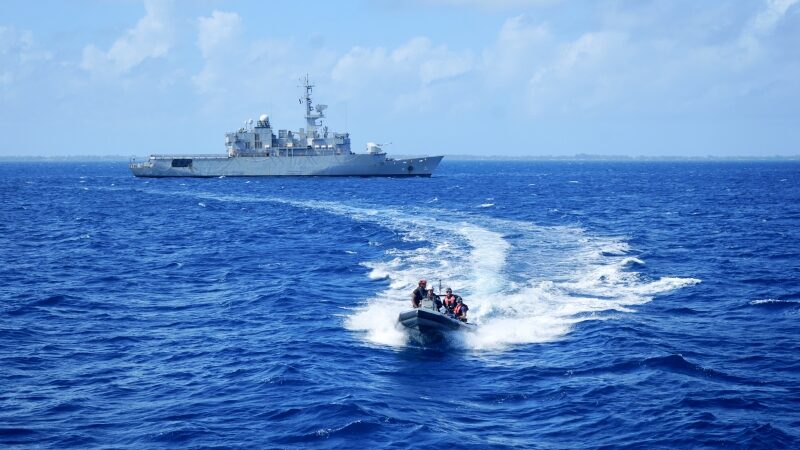Eye of the Storm? Revisiting IUU Fishing on the Global Stage – War on the Rocks

Report on Illegal, Unregulated, and Unreported (IUU) Fishing and its Global Implications
Introduction
In 2022, Aaron Delano-Johnson and Chris Bernotavicius authored an article titled “A Plan to Push Back Against China’s Fishing Practices,” emphasizing the critical issue of illegal, unregulated, and unreported fishing (IUU fishing) as a national security priority for the United States. They highlighted the strategic role of the U.S. Coast Guard in combating these practices. Three years later, this report revisits their arguments and assesses the ongoing challenges and responses on the global stage.
Context and Importance of IUU Fishing
IUU fishing undermines sustainable ocean management, threatens marine biodiversity, and jeopardizes food security worldwide. Addressing IUU fishing aligns directly with several Sustainable Development Goals (SDGs), including:
- SDG 14: Life Below Water – conserving and sustainably using the oceans, seas, and marine resources.
- SDG 2: Zero Hunger – ensuring sustainable food production systems.
- SDG 16: Peace, Justice, and Strong Institutions – promoting peaceful and inclusive societies and effective institutions.
Key Findings and Strategic Recommendations
- National Security Priority: IUU fishing is recognized as a significant threat to national and regional security, impacting economic stability and maritime sovereignty.
- Role of the U.S. Coast Guard: Positioned as a leading agency, the U.S. Coast Guard has the capacity and mandate to enforce maritime laws, conduct patrols, and collaborate with international partners to deter illegal fishing activities.
- International Collaboration: Effective response requires multilateral cooperation, information sharing, and joint enforcement efforts to address the transnational nature of IUU fishing.
- Technological Innovation: Utilization of advanced surveillance, satellite tracking, and data analytics enhances detection and monitoring capabilities.
- Policy and Regulatory Frameworks: Strengthening legal frameworks and compliance mechanisms supports sustainable fisheries management and accountability.
Implications for Sustainable Development Goals
Combating IUU fishing contributes to achieving the SDGs by:
- Protecting Marine Ecosystems (SDG 14): Reducing illegal fishing helps preserve biodiversity and maintain healthy ocean ecosystems.
- Ensuring Food Security (SDG 2): Sustainable fisheries management supports the livelihoods of millions dependent on marine resources.
- Promoting Peace and Security (SDG 16): Addressing illegal activities at sea enhances maritime security and governance.
- Fostering Partnerships (SDG 17): International cooperation is essential for effective enforcement and sustainable resource management.
Conclusion
Illegal, unregulated, and unreported fishing remains a pressing global challenge with far-reaching consequences for security, sustainability, and economic development. The U.S. Coast Guard’s leadership role, combined with international collaboration and technological advancements, is vital to countering these threats. Continued commitment to the Sustainable Development Goals will ensure that efforts to combat IUU fishing contribute to a more secure and sustainable future for the world’s oceans and communities.
1. Sustainable Development Goals (SDGs) Addressed or Connected
- SDG 14: Life Below Water – The article discusses illegal, unregulated, and unreported fishing (IUU fishing), which directly impacts marine ecosystems and sustainable use of ocean resources.
- SDG 16: Peace, Justice and Strong Institutions – The article highlights national security concerns and the role of the U.S. Coast Guard in combating illegal fishing, which relates to strengthening institutions and law enforcement.
- SDG 17: Partnerships for the Goals – The article implies the need for international cooperation and partnerships to address IUU fishing on the global stage.
2. Specific Targets Under Those SDGs Identified
- SDG 14 Targets:
- Target 14.4: By 2020, effectively regulate harvesting and end overfishing, illegal, unreported and unregulated fishing and destructive fishing practices to restore fish stocks.
- Target 14.a: Increase scientific knowledge, develop research capacity and transfer marine technology to improve ocean health and to enhance the contribution of marine biodiversity to the development of developing countries.
- SDG 16 Targets:
- Target 16.4: By 2030, significantly reduce illicit financial and arms flows, strengthen the recovery and return of stolen assets and combat all forms of organized crime.
- Target 16.6: Develop effective, accountable and transparent institutions at all levels.
- SDG 17 Targets:
- Target 17.16: Enhance the global partnership for sustainable development, complemented by multi-stakeholder partnerships that mobilize and share knowledge, expertise, technology and financial resources.
3. Indicators Mentioned or Implied to Measure Progress
- Indicator 14.4.1: Proportion of fish stocks within biologically sustainable levels. The article’s focus on combating IUU fishing implies monitoring fish stock sustainability.
- Indicator 16.4.2: Proportion of seized illicit arms that are recorded and traced. While not directly mentioned, the article’s emphasis on national security and enforcement suggests tracking illegal activities.
- Indicator 16.6.2: Proportion of the population satisfied with their last experience of public services. The article’s discussion on the U.S. Coast Guard’s role implies institutional effectiveness and public trust.
- Indicator 17.16.1: Number of countries reporting progress in multi-stakeholder development effectiveness monitoring frameworks. The article’s global stage context suggests the importance of international cooperation and reporting.
4. Table of SDGs, Targets and Indicators
| SDGs | Targets | Indicators |
|---|---|---|
| SDG 14: Life Below Water |
|
|
| SDG 16: Peace, Justice and Strong Institutions |
|
|
| SDG 17: Partnerships for the Goals |
|
|
Source: warontherocks.com








